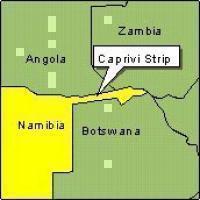







|
News and Information
UDP 'ban' draws flak
| September 5, 2006 |
 UDP 'ban' draws flak UDP 'ban' draws flak
WERNER MENGES
GOVERNMENT'S threat to in effect ban the United Democratic Party - a former DTA member party that is now advocating the secession of the Caprivi Region - for carrying out activities claimed to be in violation of Namibia's Constitution, is in itself also against the Constitution.
This was said by the National Society for Human Rights' Executive Director, Phil ya Nangoloh, yesterday.
In a statement issued by the Deputy Minister of Information and Broadcasting, Raphael Dinyando, on Friday, Government announced that no further meetings by the UDP would be allowed in Namibia.
LEGALITIES While stopping short of actually announcing that the UDP was being banned in Namibia - a step that would make it the first political party to be outlawed in Namibia since Independence - Government declared that the party's "secessionist activities (...) render it an illegal organisation".
It further warned that anyone who associated himself or herself with such an organisation, would be violating the Constitution.
In addition, Government warned that unless the UDP abandoned, rejected or denounced "its secessionist agenda", law enforcement agencies would act "according to our laws relating to the prevention of illegal gatherings, particularly because the UDP has made clear its intentions aimed at undermining our constitutional order".
"Government will continue to respect the Constitution's guarantee that protects the right of every citizen of Namibia to participate in peaceful political activity - but that right does not extend to joining an organisation "whose aims and objectives are contrary to the letter and spirit of the Namibian Constitution," Government argued in its statement.
For as long as the UDP pursued its aims peacefully, however, any move to ban or restrict it would be not just unwise, but also in itself against the Constitution, Ya Nangoloh contended yesterday.
"I think they must be allowed to advocate secession - peacefully," he stressed.
"If they do it violently, of course the law must take its course," he said.
The Namibian Constitution guaranteed freedom of speech, and that was a right that would also protect anyone wanting to publicly advocate the secession of the Caprivi Region, as long as this is done by peaceful means, he said.
The Constitution further guaranteed the right to engage in political activity - but again as long as this is done peacefully, he continued.
Restricting the UDP could be a counter-productive measure, Ya Nangoloh argued.
"The Government will shoot itself in the foot if they ever try to ban this party - unless it's a violent party," he said.
"It's politically not wise; it's constitutionally wrong."
"What if we amend the Constitution peacefully? It's the same thing," he further commented.
By refusing to allow the UDP to carry out its activities - provided these are pursued peacefully - the party may be pushed towards an option of resorting to violence instead, Ya Nangoloh added.
The UDP was formed in 1985, and became a member party of the DTA alliance.
The party broke away from the DTA in early 1999, following the expulsion of its leader, Mishake Muyongo, from the DTA, of which he had been the President, in late 1998.
In August 1999, alleged members of an alleged armed wing of the UDP, the Caprivi Liberation Army, were accused of having carried out surprise armed attacks on Government-related targets at Katima Mulilo.
That sparked a crackdown by Namibia's security forces in the Caprivi Region and led to the arrest of scores of people in the region, of whom 131 remain in Police custody facing high treason and other charges in the two pending Caprivi treason trials.
The UDP remained out of the public eye for more than six years after the attacks of August 2 1999.
However, in late July this year, Namibia's first post-Independence Commissioner of Prisons, Crispin Matongo, told The Namibian that the party was being revived, with him acting as its chairman, and that its main policy aim would be to secure the secession of the Caprivi Region from Namibia.
Matongo emphasised, though, that this was to be done peacefully, and shot down suggestions that the party might opt to resort to violence or armed means to attain its goal.
|
Source: www.namibian.com.na |
| http://www.namibian.com.na/ |
|
| Support Caprivi Freedom |
Fill out the form below to become a member of this site and receive our regular newsletter.
|

|

